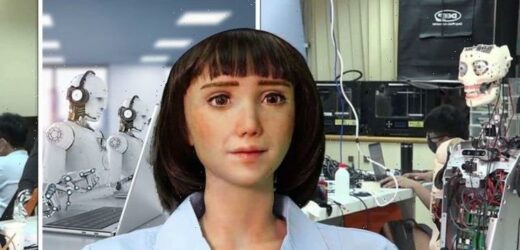Tesla: Elon Musk details plans to create humanoid robot
We use your sign-up to provide content in ways you’ve consented to and to improve our understanding of you. This may include adverts from us and 3rd parties based on our understanding. You can unsubscribe at any time. More info
And one of the scientists behind the pioneering technology said the “nursing assistant” machine, named Grace, designed to provide help and companionship to elderly people – will even be able to discuss the weather with them. Grace will make just her second public appearance at the 14th Conference on Artificial General Intelligence, alongside Dr Ben Goertzel, the founder of AI research company SingularityNET.
She is described by the company as the “little sister” of Sophia, a “social humanoid robot” developed by Hong Kong-based Hanson Robotics and activated in 2016.
Janet Adams, Chief Operating Officer at SingularityNET, told Express.co.uk: “Grace’s hardware is based on the same Hanson Robotics platform as Sophia.
“However, their AI software is quite different.”


Sophia was a character intended to carry out a wide variety of different interactions, whereas Grace was specifically focused on healthcare, serving in her first role as a “nursing assistant and social companion for senior adults”.
Ms Adams said: “Grace’s relatively specialised focus has allowed us to take a different approach to her software, which incorporates some more sophisticated AI tools that have been more straightforward to get working in the narrower realm.
“Grace’s software leverages the OpenCog AI systems in more advanced ways than Sophia’s occasional use of OpenCog, and leverages some subtle interoperation between OpenCog and a variety of neural vision and language models.”
JUST IN: EU stitch-up! Hated deal lets European firms cash in

By using alternative “software architecture”, Grace is capable of using different sorts of reasoning and perception to Sophia, Ms Adams explained – although both are “rapidly evolving systems”.
She added: “The plan is to upgrade Grace to the new OpenCog Hyperon system in late 2022 or early 2023, which should be a major step toward general intelligence – the details of the in-development Hyperon system and how it will work in Grace’s context will be described in Dr Goertzel’s talk on October 16 at the AGI event.
“Meanwhile, SingularityNET and Hanson Robotics are launching a project called SophiaDAO, which is adapting the software underlying Grace for Sophia, as part of SophiaDAO’s initiative to use Sophia to run a broad variety of AI systems. So in 2022, we may see some versions of Sophia running Grace-like software.”
DON’T MISS:
Pompeii experts blown away by ‘best-preserved remains ever found’ [INSIGHT]
Here we go! Musk ‘interested’ in building UK gigafactory [SPOTLIGHT]
‘Holy s***!’ Reporters ‘gasp’ as Joe Biden walks out of briefing [REVEAL]


Assessing Grace’s capabilities, Ms Adams said: “Grace isn’t an independent, thinking being like you or I – though she can do a convincing impression of one from time to time.
“‘Intelligence’ is a slippery concept to define. If the ability to solve some problems independently is sufficient to be considered artificially intelligent, then definitely Grace is intelligent and her intelligence is gradually increasing. “
There was a specific engineering plan aimed at advancing Grace progressively toward “human-level Artificial General Intelligence”, beginning with the port of Grace’s internal software to OpenCog Hyperon late this year or early next.

Grace is specifically designed to seem “human”, Ms Adams stressed.
She said: “As humans, we are wired to respond to things like eye contact, facial expressions, shared gaze.
“We are wired to respond to a human face in front of us talking about the same stuff we’re talking about.
“Grace is designed to trigger these responses. When the magic works, she gives people a feeling of connection, sharing ideas, and being listened to.

“You could have a conversation with her about the weather, about hobbies, a person’s family members, where they like to go on holiday etc.”
While mainstream AI research is generally about domain-dependent solutions to specific problems, AGI pursues the original goal of building systems with intelligence comparable and ultimately superior to that of the human mind.
Speaking about the event being held in the San Francisco Bay Area, Dr Goertzel said: “The breadth and scope of this year’s keynotes and workshops are a testimony to the unprecedented momentum we now see in the AGI field.
“It becomes more and more clear that the dreams of the original founders of AI are within reach.”
Source: Read Full Article


